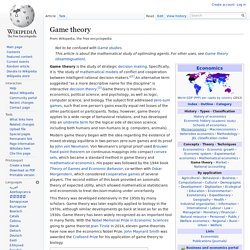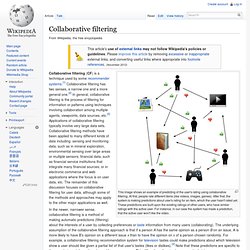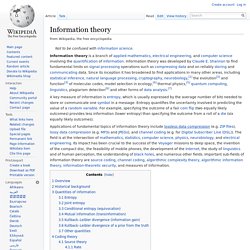

Game theory. Game theory is the study of strategic decision making.

Specifically, it is "the study of mathematical models of conflict and cooperation between intelligent rational decision-makers. "[1] An alternative term suggested "as a more descriptive name for the discipline" is interactive decision theory.[2] Game theory is mainly used in economics, political science, and psychology, as well as logic, computer science, and biology. The subject first addressed zero-sum games, such that one person's gains exactly equal net losses of the other participant or participants.
Today, however, game theory applies to a wide range of behavioral relations, and has developed into an umbrella term for the logical side of decision science, including both humans and non-humans (e.g. computers, animals). Modern game theory began with the idea regarding the existence of mixed-strategy equilibria in two-person zero-sum games and its proof by John von Neumann. Representation of games[edit] Extensive form[edit] Collaborative filtering. This image shows an example of predicting of the user's rating using collaborative filtering.

At first, people rate different items (like videos, images, games). After that, the system is making predictions about user's rating for an item, which the user hasn't rated yet. These predictions are built upon the existing ratings of other users, who have similar ratings with the active user. For instance, in our case the system has made a prediction, that the active user won't like the video. Collaborative filtering (CF) is a technique used by some recommender systems.[1] Collaborative filtering has two senses, a narrow one and a more general one.[2] In general, collaborative filtering is the process of filtering for information or patterns using techniques involving collaboration among multiple agents, viewpoints, data sources, etc.[2] Applications of collaborative filtering typically involve very large data sets.
Introduction[edit] Methodology[edit] Types[edit] Memory-based[edit] . and. Information theory. Overview[edit] The main concepts of information theory can be grasped by considering the most widespread means of human communication: language.

Two important aspects of a concise language are as follows: First, the most common words (e.g., "a", "the", "I") should be shorter than less common words (e.g., "roundabout", "generation", "mediocre"), so that sentences will not be too long. Such a tradeoff in word length is analogous to data compression and is the essential aspect of source coding. Second, if part of a sentence is unheard or misheard due to noise — e.g., a passing car — the listener should still be able to glean the meaning of the underlying message. Such robustness is as essential for an electronic communication system as it is for a language; properly building such robustness into communications is done by channel coding.
Note that these concerns have nothing to do with the importance of messages. Historical background[edit] With it came the ideas of This is justified because.